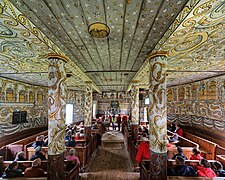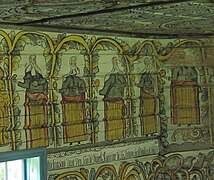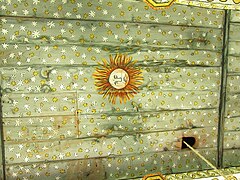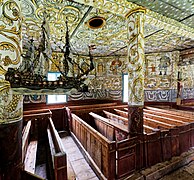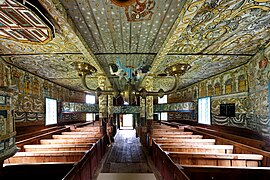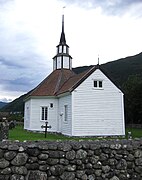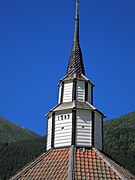
Ulvik Church is a parish church of the Church of Norway in Samnanger Municipality in Vestland county, Norway. It is located in the village of Ulvik. It is the church for the Ulvik parish which is part of the Hardanger og Voss prosti (deanery) in the Diocese of Bjørgvin. The white, wooden church was built in a cruciform design in 1859 using plans drawn up by the architect Hans Linstow. The church seats about 500 people.
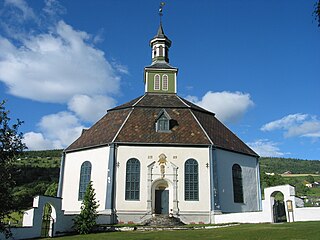
Sør-Fron Church is a parish church of the Church of Norway in Sør-Fron Municipality in Innlandet county, Norway. It is located in the village of Hundorp. It is the church for the Sør-Fron parish which is part of the Sør-Gudbrandsdal prosti (deanery) in the Diocese of Hamar. The white, stone church was built in an octagonal design in 1792 using plans drawn up by the architect Svend Aspaas. The church seats about 750 people.

Eid Church is a parish church of the Church of Norway in Rauma Municipality in Møre og Romsdal county, Norway. It is located in the village of Eidsbygda. It is the main church for the Eid og Holm parish which is part of the Indre Romsdal prosti (deanery) in the Diocese of Møre. The white, wooden church was built in a long church design in 1797 using plans drawn up by an unknown architect. The church seats about 190 people.

Tresfjord Church is a parish church of the Church of Norway in Vestnes Municipality in Møre og Romsdal county, Norway. It is located in the village of Tresfjord. It is the church for the Tresfjord parish which is part of the Indre Romsdal prosti (deanery) in the Diocese of Møre. The white, wooden church was built in an octagonal style in 1828 using plans drawn up by the architect and master builder Erik Kroken. The church seats about 220 people.

Haram Church is a parish church of the Church of Norway in Ålesund Municipality in Møre og Romsdal county, Norway. It is located in the village of Austnes on the island of Haramsøya. It is one of the churches for the Haram og Fjørtoft parish which is part of the Nordre Sunnmøre prosti (deanery) in the Diocese of Møre. The white, wooden church was built in an octagonal design in 1838 using plans drawn up by the parish priest Peder Thomas Buschmann. The church seats about 240 people.

Ulstein Church is a parish church of the Church of Norway in the municipality of Ulstein, Møre og Romsdal, Norway. It is located in the town of Ulsteinvik on the western side of the island of Hareidlandet. It is the church for the Ulstein parish which is part of the Søre Sunnmøre prosti (deanery) in the Diocese of Møre. The white, wooden church was designed in an octagonal design in 1849 using plans drawn up by Hans Nicolai Wraamann, the local parish priest. The church seats about 400 people. Originally, the church was built about 2 kilometres (1.2 mi) north of Ulsteinvik, but in 1878 it was taken down and moved into Ulsteinvik.
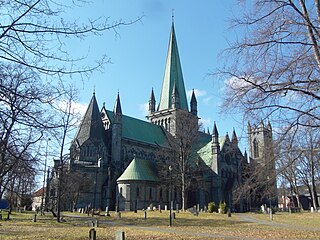
Church building in Norway began when Christianity was established there around the year 1000. The first buildings may have been post churches erected in the 10th or 11th century, but the evidence is inconclusive. For instance under Urnes Stave Church and Lom Stave Church there are traces of older post churches. Post churches were later replaced by the more durable stave churches. About 1,300 churches were built during the 12th and 13th centuries in what was Norway's first building boom. A total of about 3,000 churches have been built in Norway, although nearly half of them have perished. From 1620 systematic records and accounts were kept although sources prior to 1620 are fragmented. Evidence about early and medieval churches is partly archaeological. The "long church" is the most common type of church in Norway. There are about 1620 buildings recognized as churches affiliated with the Church of Norway. In addition, there are a number of gospel halls belonging to the lay movement affiliated with the Church of Norway as well as churches belonging to other Christian bodies. Until the 20th century, most churches were built from wood. 220 buildings are protected by law, and an additional 765 are listed as valuable cultural heritage.

Old Gimmestad Church is a former (historic) parish church of the Church of Norway in Gloppen Municipality in Vestland county, Norway. It is located in the village of Sørstranda. It was once the church for the Gimmestad parish which is part of the Nordfjord prosti (deanery) in the Diocese of Bjørgvin, but it now serves mostly as a museum. The red, wooden church was built in a long church style in 1692 by an unknown architect. The church seats about 80 people.

Holsen Church is a parish church of the Church of Norway in Sunnfjord Municipality in Vestland county, Norway. It is located in the village of Holsen. It is one of the two churches for the Holsen og Haukedalen parish which is part of the Sunnfjord prosti (deanery) in the Diocese of Bjørgvin. The white, wooden church was built in a long church style in 1861 using designs by the architect Jacob Wilhelm Nordan. The church seats about 200 people.
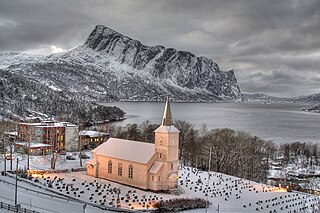
Hyllestad Church is a parish church of the Church of Norway in Hyllestad Municipality in Vestland county, Norway. It is located in the village of Hyllestad. It is one of the three churches for the Hyllestad parish which is part of the Sunnfjord prosti (deanery) in the Diocese of Bjørgvin. The white, wooden church was built in a long church design in 1880 using plans drawn up by the architect Johannes Henrik Nissen. The church seats about 300 people.

Old Årdal Church is a historic parish church of the Church of Norway in Hjelmeland Municipality in Rogaland county, Norway. It is located in the village of Årdal. It used to be the church for the Årdal parish which is part of the Ryfylke prosti (deanery) in the Diocese of Stavanger. The red, wooden church was built in a long church design in 1620 using designs by an unknown architect. The church seats about 175 people.

Bore Church is a parish church of the Church of Norway in Klepp Municipality in Rogaland county, Norway. It is located in the village of Bore. It is the church for the Bore parish which is part of the Jæren prosti (deanery) in the Diocese of Stavanger. The white, wooden church was built in a long church style in 1891 using designs by the architect Hartvig Sverdrup Eckhoff. The church seats about 165 people.
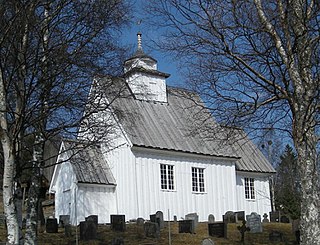
Old Bykle Church is a former parish church of the Church of Norway in Bykle Municipality in Agder county, Norway. It is located in the village of village of Bykle. It is one of the churches for the Bykle parish which is part of the Otredal prosti (deanery) in the Diocese of Agder og Telemark. The white, wooden church was built in a long church design around the year 1620 using plans drawn up by an unknown architect. The church seats about 140 people on the main floor and balcony.

Hylestad Church is a parish church of the Church of Norway in Valle Municipality in Agder county, Norway. It is located in the village of Rysstad. It is one of the churches for the Valle og Hylestad parish which is part of the Otredal prosti (deanery) in the Diocese of Agder og Telemark. The white, wooden church was built in a octagonal design in 1838 by Anders Thorsen Syrtveit using plans drawn up by the famous architect Hans Linstow. The church seats about 200 people.

Sandnes Church is a parish church of the Church of Norway in Bygland Municipality in Agder county, Norway. It is located in the village of Åraksbø on the east side of the Åraksfjorden. It is one of the churches for the Bygland og Årdal parish which is part of the Otredal prosti (deanery) in the Diocese of Agder og Telemark. The white, wooden church was built in a octagonal design in 1844 by Anders Thorsen Syrtveit who used plans drawn up by the famous architect Hans Linstow. The church seats about 200 people.

Hornnes Church is a parish church of the Church of Norway in Evje og Hornnes Municipality in Agder county, Norway. It is located in the village of Hornnes. It is one of the churches for the Evje og Hornnes parish which is part of the Otredal prosti (deanery) in the Diocese of Agder og Telemark. The white, wooden church was built in an octagonal design in 1828 by Leg Askildsen Hallingskaar, a builder from Laudal who was using plans drawn up by the architect Lars Larsen Forsæth. The church seats about 300 people.
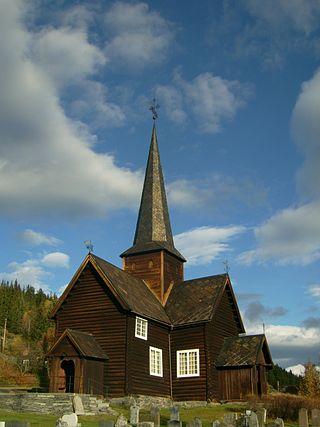
Kvikne Church is a parish church of the Church of Norway in Nord-Fron Municipality in Innlandet county, Norway. It is located in the village of Kvikne. It is the church for the Kvikne parish which is part of the Nord-Gudbrandsdal prosti (deanery) in the Diocese of Hamar. The brown, wooden church was built in a cruciform design in 1764 using plans drawn up by the architect Per Korpberget. The church seats about 160 people.

Veum Church is a parish church of the Church of Norway in Fyresdal Municipality in Telemark county, Norway. It is located in the village of Øyane. It is one of the two churches for the Fyresdal parish which is part of the Øvre Telemark prosti (deanery) in the Diocese of Agder og Telemark. The white, wooden church was built in a long church design in 1863 using plans drawn up by the architect Christian Grosch. The church seats about 180 people.
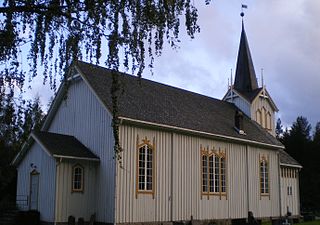
Vrådal Church is a parish church of the Church of Norway in Kviteseid Municipality in Telemark county, Norway. It is located in the village of Vrådal. It is one of the churches in the Kviteseid parish which is part of the Øvre Telemark prosti (deanery) in the Diocese of Agder og Telemark. The white, wooden church was built in a long church design in 1887 using plans drawn up by the architect Christian Grosch. The church seats about 170 people.
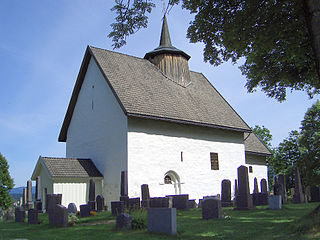
Old Bø Church is a former parish church of the Church of Norway in Midt-Telemark Municipality in Telemark county, Norway. It is located in the village of Bø. It used to be the main church for the Bø parish which is part of the Øvre Telemark prosti (deanery) in the Diocese of Agder og Telemark. The white, stone church was built in a long church design around the year 1179 using plans drawn up by an unknown architect. The church seats about 150 people. This church was closed in 1875 when the new Bø Church was opened. This church is now preserved as a museum.


